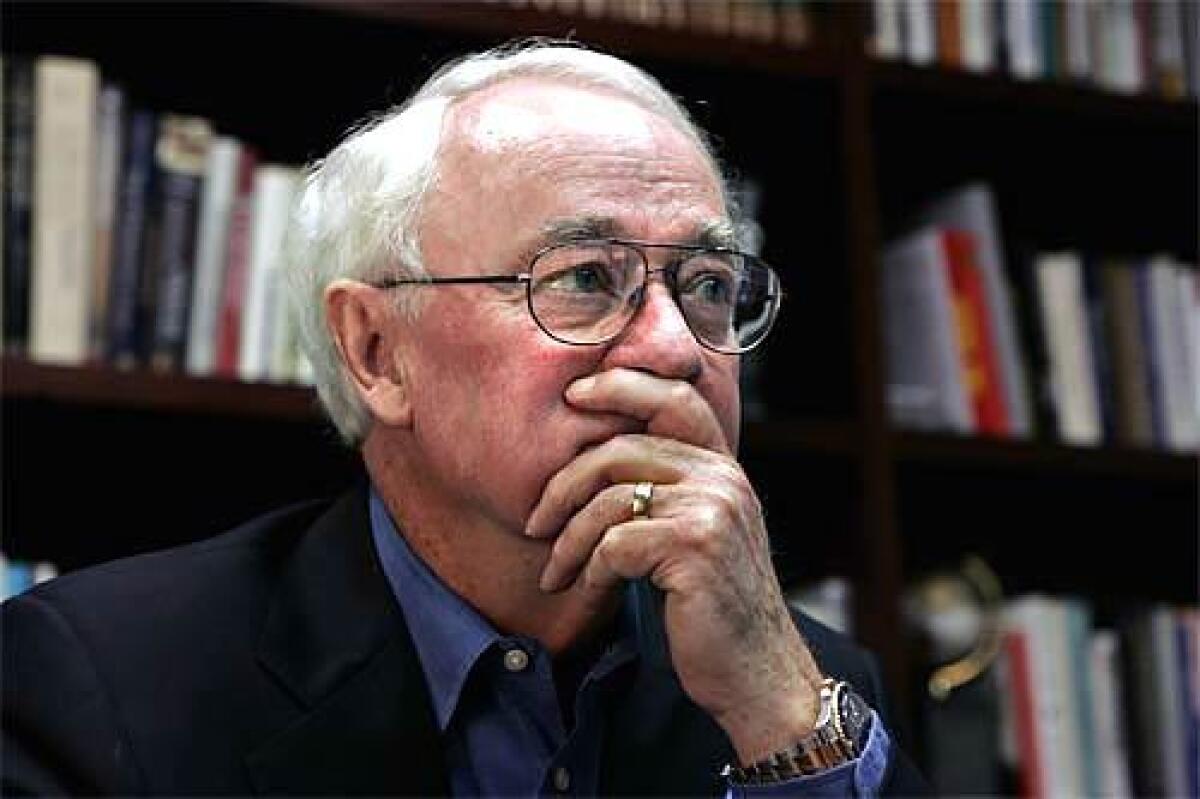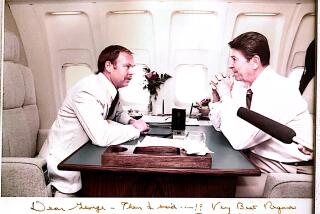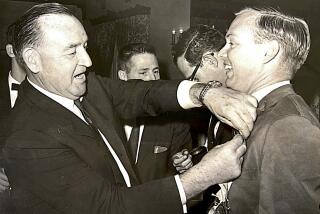James Q. Wilson: The power of his written word

Southern California is home to extremes — poverty, crime, wealth and immigration; shifting politics and emerging arts; ethnic vitality and conflict — and also to a wealth of imagination. To plumb that creativity, Editorial Page Editor Jim Newton held a series of discussions about our region with some of the area’s most engaging intellects. This is the first installment of an occasional series.
James q. wilson left Southern California as a young man and returned to it as an accomplished one, but he is not exactly a product of it nor is he a participant in its civic life by most conventional definitions. He holds no local position, serves no local board, aspires to no local office.
And yet Wilson’s abiding intellectual pursuits — morality, the family and crime, to name just three — have helped shape modern Los Angeles, both through his influence on its recent leaders and through his enormous contributions to political science.
His writings on crime, for instance, constitute a near-blueprint for the Los Angeles Police Department. And some of his scholarship, including his studies of urban renewal and his examination of the societal effects of declining commitment to marriage, has particular resonance in this diverse city, with its extensive poverty and many broken homes.
Wilson is the rare academic who bears a Presidential Medal of Freedom, an esteemed prize represented by a modest emblem that he affixes to his lapel. “Whatever his subject,” President Bush said in presenting the medal, “James Q. Wilson writes with intellectual rigor, with moral clarity, to the appreciation of a wide and growing audience.”
An endorsement from Bush is complicated currency in the largely liberal milieu that forms Los Angeles’ contemporary elite, one in which members may dispute the relative merits of Hillary Clinton and Barack Obama but in which most long ago lost patience with Bush. Wilson, however, has spent decades composing a body of work that is testament to his curiosity and his honesty, impressing readers of all ideological stripes. He describes himself as more conservative than most academics but more liberal than the country as a whole.
Wilson’s principal effect is through his writing, some of it amplified by his relationships with civic leaders. Police Chief William J. Bratton is a disciple of Wilson’s policing strategies. And former Mayor Richard Riordan calls Wilson the most intellectually honest person he knows — someone interested in exploring questions, not dictating answers.
Wilson expressed a similar view of himself and his work. “I often write books about problems for which I can’t think of a solution,” he said. “The reason I write the book is not because I know what I want to say to the public. I write the book in order to figure out for myself what I think about the subject.”
He has his doubts about the Los Angeles Times and other leading American papers. He has questioned this paper’s coverage of Iraq, and he argues that the liberal views of many journalists have undermined the war and American foreign policy generally.
Nevertheless, he spoke at length to The Times as part of this series. He took all questions, and his observations ranged across the wide expanse of his contribution to social thought — divorce and same-sex marriage, human development and the establishment and maintenance of a free and ordered society.
Wilson, 76, opened the conversation by indulging in a moment of nostalgia, drawing on two socially relevant memories of his youth.
‘Igrew up when the freeways were first being built,” he said, seated before a bank of books at Pepperdine University, where he is a visiting lecturer. Before then, he said, he would drive from Long Beach to Hollywood on Alameda Avenue “to take my date to the Palladium Theater, where we would go dancing. Then the freeway was developed, and it was just marvelous. It was heaven.” He laughed at that notion — freeways as heaven.
Shaking his head, he continued: “The second thing I recall growing up was that the level of public order and safety was remarkable.”
After attending college at the University of Redlands, Wilson left California for most of his young adult life. He received his graduate education at the University of Chicago and taught at Harvard from 1961 to 1987. Those were productive years: Wilson wrote the articles and books that established him as one of the nation’s premier political scientists.
In the 1960s, he explored urban renewal even as riots were tearing apart the nation’s cityscapes. In the 1970s, he challenged the then-conventional wisdom that the goal of criminal justice was rehabilitation, insisting that deterrence was the system’s more important objective. Through the 1980s, he explored criminal justice further, along with regulation and bureaucracy, among other topics.
The following decade brought what many, including Wilson, consider his masterwork, “The Moral Sense,” published in 1993 after his return to California.
“The Moral Sense” was Wilson’s study of the evolutionary and cultural bases of morality and, at the same time, a radiant display of writing. With chapters examining such notions as sympathy, self-control and duty, Wilson built the proposition that morality is constructed in the intimacy of families and then spread unsteadily but unerringly across humanity.
His conclusion: “Mankind’s moral sense is not a strong beacon light, radiating outward to illuminate in sharp outline all that it touches. It is, rather, a small candle flame, casting vague and multiple shadows, flickering and sputtering in the strong winds of power and passion, greed and ideology. But brought close to the heart and cupped in one’s hands, it dispels the darkness and warms the soul.”
“The Moral Sense” defied ideological categorization. Its herald to values heartened many conservatives, but it wasted no time with those who, for instance, questioned evolution — Charles Darwin was cited repeatedly and favorably, once for his “utmost clarity.” Moreover, Wilson resisted the temptation to overreach. Glibness has no more formidable foe than James Q. Wilson.
At one point, he noted that moral relativism “has probably contributed to the increase in crime rates” — soothing words to the conservative ear. But he quickly added: “Having said that the moral climate has probably affected the level of crime, let me now say that it probably has not affected it dramatically.” Liberals could relax.
“ ‘The Moral Sense’ was, to me, the most important book I’ve ever written,” he said. “It sums up what I think about human society, about the importance of human character. It talks about how much of it naturally grows and how resistant it is even to many very harmful external influences.”
Similarly, Wilson’s more recent examination of marriage unequivocally asserted that marriage is good for children and good for society, but he declined to blame divorce on the 1960s, which he wryly described as “the sovereign explanation of all cultural ills.”
In one area, Wilson is not just influential or provocative. He is gospel. Along with coauthor George Kelling, he is the inventor of the “broken windows” theory of public order and, as such, the father of community policing. That idea postulates that public order, not just public safety, is a crucial objective of policing and that strategies to maintain order will yield results in crime trends as well.
Wilson’s thoughts on policing are so widely adopted that to question them is heresy. He acknowledges that he is pleased by the effect of his work, but adds that he is happy “up to a point.” Characteristically, Wilson is willing to raise questions where others do not — even about his own theory.
That is the social scientist in him, nagging even at his own work. Wilson for years has urged policymakers to design tests of community policing to see whether it does, in fact, produce the results that he argued it would.
Nevertheless, he is impressed by some of those who have attempted to put his ideas into practice. And among those who receive his highest praise is Bratton, who has preached community policing in Boston, New York and Los Angeles and who, along with Mayor Antonio Villaraigosa, recently launched a much-publicized crackdown on area gangs.
“We haven’t come to grips with our gang problem adequately,” Wilson said. “Chief Bratton has announced some police strategies for dealing with gangs. He’s had some early successes.” Wilson acknowledges that Bratton’s recent efforts have been controversial and that some critics have argued against making police the principal tool in tackling gangs. Those critics generally cite the need for social services, such as employment and education assistance, as more important in the long run than law enforcement. Wilson disagrees, at least in part.
“People who criticize a law-enforcement-only approach have a good point, but to begin on this problem, you have to solve the personal-protection issue,” he said.
Until young boys and girls can be protected from gang violence, they will be inclined to join gangs for protection, he added. And only law enforcement can provide that protection.
From his post at Pepperdine, Wilson continues to roam the nation’s social and political debates. Having written extensively on marriage, Wilson willingly contests the notion that gays should be allowed to partake in that institution.
“To me, marriage is about the union of a man and a woman for the purposes of having exclusive sex and procreating children,” he said. “That has been the function of marriage in every culture as far as we have any cultural records.”
Yet Wilson is willing to listen to his opponents (and, unlike many who agree with him, he is willing to admit that gay marriage is not something we should “make too much of”). That same blend of historical analysis and openness to disagreement stretches across other topics: Wilson hears the arguments of animal rights advocates but sees humans as omnivores and pet owners; he admits to not liking everything about Bush but credits him with reducing marginal tax rates and with waging an important war in Iraq.
“Saddam Hussein,” Wilson said, “was a monster,” and toppling him was a gift to his country. Today, Wilson laments the stark and historically anomalous partisan divide over that war.
And so Wilson has resettled into the life of his home region, living now in Malibu — less than 50 miles from his childhood home in Long Beach — immersed in a community more liberal than he but one formed in part by his work. He is, it is obvious, happy to be back.
“Boston and Los Angeles are fundamentally different places — not just physically, not just in terms of the weather,” he said. “As soon as our children were grown and married, my wife and I sat down in the front room and looked at each other and said: ‘It’s time to go home.’ ”
Jim Newton is Editorial Page editor of The Times. jim.newton@latimes.com
More to Read
A cure for the common opinion
Get thought-provoking perspectives with our weekly newsletter.
You may occasionally receive promotional content from the Los Angeles Times.







